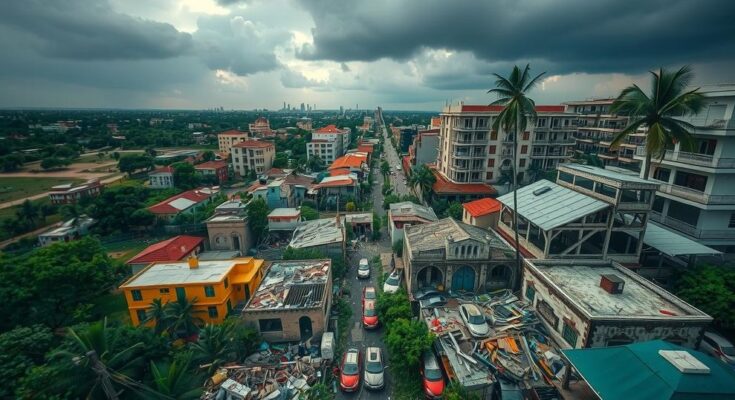A powerful 6.8-magnitude earthquake struck eastern Cuba, causing damage amid ongoing recovery from prior hurricanes. President Miguel Diaz-Canel reported landslides and structural damage, particularly affecting Santiago de Cuba and Granma. Residents felt the earthquake was one of the strongest ever experienced, adding to the challenges of an already struggling economy and infrastructure.
A significant earthquake measuring 6.8 on the Richter scale struck eastern Cuba, exacerbating the challenges faced by residents still recovering from recent catastrophic storms. The United States Geological Survey reported the earthquake occurred approximately 40 kilometers south of Bartolome Maso. Although no casualties have been reported thus far, President Miguel Diaz-Canel acknowledged that landslides and damage to homes and power lines were recorded, particularly in the Santiago de Cuba and Granma regions. In the wake of this earthquake, residents expressed their distress, noting that this tremor was the most severe they had experienced in years, with many recalling previous earthquakes but none comparable to this one. Furthermore, Cuba’s already strained infrastructure, which has suffered from recent hurricanes, is now under increased pressure. Images of collapsed terracotta roofs and damaged concrete structures highlight the extent of the devastation, complicating recovery efforts further. Disaster relief efforts are now underway, with a primary focus on assessing the damage to initiate recovery. The tremor adds another layer of distress for the Cuban populace who are still grappling with the aftermath of Hurricanes Oscar and Rafael, both of which caused widespread devastation, displacement, and power outages across the nation. The cumulative effect of these disasters has intensified the struggles of a nation facing significant economic challenges and infrastructure issues. As the situation progresses, the government has prioritized the safety of its citizens while striving to restore normalcy as quickly as feasible.
Cuba has recently faced an array of natural disasters, including hurricanes that have overwhelmed infrastructure and led to severe economic repercussions. Hurricanes Oscar and Rafael caused significant damage earlier, including power outages affecting millions and fatalities. The nation’s capacity to rebound is further hampered by outdated housing and infrastructure systems, which are particularly vulnerable to seismic activity. The occurrence of this earthquake amid these pre-existing challenges worsens the already dire living conditions for many Cubans, significantly impacting recovery initiatives.
In conclusion, the 6.8-magnitude earthquake that struck eastern Cuba poses significant challenges to a region already beleaguered by recent hurricanes and economic instability. Governmental and emergency services are working diligently to evaluate damage and ensure the safety of the populace. As Cuba continues to navigate this multifaceted crisis, the resilience of its citizens and the capacity of its infrastructure will be critically tested in the wake of these disasters.
Original Source: www.aljazeera.com




